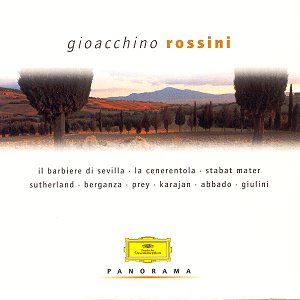Gioacchino ROSSINI
Overtures: La Gazza Ladra; L'Italiana in Algeri; La Scale di Seta;
Semiramide; Guillaume Tell
Sonatas for Strings: 1 in G, 3 in C
Berlin Philharmonic Orchestra/Herbert von Karajan
Il Barbiere di Siviglia: Overture; Largo al factotum; All'idea
di quel metallo; Una voce poco fa
Luigi Alva (Almaviva); Teresa Berganza (Rosina); Hermann Prey (Figaro),
London Symphony Orchestra/Claudio Abbado
Semiramide: Serena i vaghi rai; Bel raggio lusinghier; Dolce pensiero;
Ebben, a te: ferisci; Giorno d'orrore!; Madre, addio
Dame Joan Sutherland (Semiramide), Marilyn Horne (Arsace), Ambrosian
Opera Chorus, London Symphony Orchestra/Richard Bonynge
La Cenerentola: Una volta c'era un re; O figlie amabili; Nacqui
all'affanno
Renato Cappecchi (Dandini), Paolo Montarsolo (Don Magnifico), Margherita
Guglielmi (Clorinda), Laura Zanini (Tisbe), Teresa Berganza (Cenerentola),
Ugo Trama (Alidoro), Scottish Opera Chorus, London Symphony Orchestra/Claudio
Abbado
Stabat Mater: Cuius animam; Inflammatus et accensus
Katia Ricciarelli (soprano), Dalmacio Gonzales (tenor), Philharmonia
Chorus and Orchestra/Carlo Maria Giulini
 DG Panorama 469 193-2 (2
CDs): [72.18+77.01]
DG Panorama 469 193-2 (2
CDs): [72.18+77.01]
Crotchet
AmazonUK
AmazonUS

The booklet notes seem to have been written about thirty years ago. Having
dwelt on the great popularity of Rossini's operas during his lifetime, one
Oliver Buslau informs us that "Nowadays, only a few of them, such as The
Barber of Seville and La Cenerentola, hold a place in the regular
repertory, and the rest … are the reserve mainly of specialists and
bel canto buffs". If this is really still so in the writer's native
Germany I am very sorry for them all because elsewhere, on both sides of
the Atlantic, opera houses have found ample room for both the comic and the
serious Rossini, ever since Sutherland and Horne demonstrated, in the 1960s,
how it should be sung. Equally antiquated is the insistence on Rossini's
prowess as chef and gourmet with nary a word (my turn to be antiquated!)
about the plots of the operas highlighted or the music in general (can we
assume that the public at which these packs are aimed does not need to be
told what a Stabat Mater is?).
All this is a great pity because the discs themselves are about as good a
Rossini primer as the first-time buyer could get. I don't think Herbert von
Karajan ever conducted Rossini in the opera house (he certainly recorded
no complete operas) but with the overtures this doesn't seem to matter. One
of the finest overture discs ever was conducted by Fritz Reiner who is unlikely
to have had much time for him in the theatre, and a now-forgotten LP under
Eduard van Beinum was a standard recommendation for many years. Karajan has
the lightest of touches, with phrasing which is by turns delicate and vivacious
and, yes, he even finds fun in the music, together with a real appreciation
of Rossini's orchestration. The recording is a little odd and seems to have
been made in a tunnel, but I quickly forgot about it. Here is as fine a selection
of Rossini overtures as you'll get. Not long ago I was remarking that conductors
of the past were more ready than those of today to give their all to relatively
light repertoire. Karajan conducts here as if this is, for the moment, the
only music that matters to him.
Charming as the string sonatas are (and Karajan is able to avoid them becoming
heavy with a full complement of strings) perhaps the space occupied by these
gifted teenage works would have been better given to further operatic extracts.
Some of the finest Rossini performances of recent years have been conducted
by Claudio Abbado. There is a nervous brilliance to his interpretations which
marks them out from the bonhomie of an old-timer like Vittorio Gui, but I
intend simply to remark on the differences rather than indicate a preference.
Certainly Abbado leaves you in no doubt that this is great music and not
just a funny story made into an opera. The singers are well-chosen to fit
into his conception, with Figaro's aria presented as a brilliant piece of
music rather than a comic turn. Berganza is fine, but it must be said that
if you go back to her 1959 version of Nacqui all'affanno from a recital
conducted by Sir Alexander Gibson and recently included in Decca's Rossini
Gala (458 247-2), her voice had a bloom in those days which had rather dried
out by 1972. Still, the technical armoury remains and only critics are obliged
to make these unchivalrous comparisons!
As I said above, it was Sutherland and Horne who brought about the Rossini
revival and the Semiramide excerpts from a vintage 1966 set show why.
It's practically all one long vocal firework after another. I was a little
surprised to find Sutherland's timbre so dark at the beginning of Bel
raggio lusinghier. Her 1960 performance has come my way twice recently,
on the above-mentioned Rossini Gala and on the complete reissue in the Decca
Legends series of her stunning recital "The Art of the Prima Donna" (467
115-2 and an indispensable purchase). This one is a semitone down! Since
Richard Bonynge has always been a thorough student of the various versions
of these operas I take it that the present version reflects Rossini's intentions,
though I must say that the higher pitch suits Sutherland's voice better.
Great singing all the same.
In the Stabat Mater Giulini finds reverence and drama where most
conductors take Cuius animam, in particular, to be a perky little
march. Gonzales's fresh-toned, if not always completely even, tenor gives
pleasure. Only recently I was praising Ricciarelli's Turandot, but here she
throws several hostages to fortune with squally high notes (though the top
C is still excellent) and a bumpy line.
Despite reservations, the first-time Rossini buyer will get a very good idea
of what the composer is all about. If you already have a disc of overtures,
may I repeat my recommendation of the Rossini Gala?
Christopher Howell

